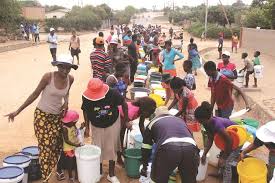Climate change has resulted in reduced industrial productivity and increased human and wildlife conflicts, an African Union official has noted.
These remarks were made during a virtual Water, Sanitation and Energy Conference held Thursday by senior policy officer, Division of environment, climate change, water and land management at the African Union Commission Leah Wanambwa Naess.
The conference was being held under the theme: “The impact of climate change and subsequent water crisis on Zimbabwe’s capacity utilisation.”
Naess said the effects of climate change, which are mainly the current water crisis, are being endured at an time when the world is fighting Covid-19, a disease which requires maximum hygiene.
“Without water we can not have basic things such as agriculture and wildlife. We need it to survive and for sanitation. We are even faced with Covid-19 hence we have realised that water is our first line of defence as we are required to wash our hands regularly and stay in highly hygienic areas. Essentially water is our lifeline at the moment,” she said.
Naess said wildlife has also been affected by the effects of climate change as they are now struggling to acquire grazing lands and water.
“Natural vegetation and water sources have been immensely affected. This has resulted in an increase of human and wildlife conflicts where wild animals move from national parks towards human settlement areas in search of water,” she said.
“Due to limited rainfall, dam water levels have drastically reduced resulting in countries which rely on hydro-generated electricity suffering power shortages. This has resulted in industries and various other businesses shutting down thus eliminating people’s sources of income. Some end up resorting to deforestation activities and/or mining activities which result in further land degradation.”
Naess reiterated that to adapt to these climate change conditions, people need to adapt to alternative methods of using water, especially as far as agricultural activities are concerned.
“Farmers can be trained on water-saving irrigation methods. Countries with deserts can also share ideas with fellow countries in order to be able to conserve the limited amount of water that is there,” she said.
“Governments are also urged to encourage citizens to practice water harvesting methods to capture rain water through the use of tanks and gutters instead of letting all the water go to waste.”

